An investigative report prepared by: Taya Badr Al-Deen, Tahani Saadan, and Maab Mirghani
Summary
● An expert in reproductive health: their forced departure from their homes without taking the necessary precautions causes an increase in psychological stress.
● United Nations Fund: Displacement camps in Darfur are threatened by sexual and physical assault on displaced women.
● Secondary school teacher: There is a low awareness of the importance of education, as well as the absence of a deterrent law obligating families to educate their children. This is due to the lack of commitment by the relevant authorities to make education free.
● Nature conservation officer: The destruction of schools directly affected the educational process of males and females.
● Female farmer: Female farmers' suffering increased from back pain, spinal cord pain, and sunstroke due to working extra hours.
The phrase “climate change” was repeated frequently in news bulletins, press materials, and other social media content. Climate is the weather condition over a long period, and it is the expected value of humidity, wind, rain, temperature, and atmospheric pressure for a wide geographical area.
Climate change is defined as the change that occurs in the climate of the region or the climate of the world over a long time, which may exceed centuries. The reason behind this change lies in the internal processes of the Earth or some human activities, and the most important of these changes is the change in temperature on the Earth’s surface.
In parallel with an important event such as the African Climate Summit, which was held in September 2023 before the Conference of the Parties of the UNFCCC, known as COP28, held in the United Arab Emirates, many countries witnessed extreme climate events and natural disasters. The most notable was Hurricane Daniel in Libya, which affected the infrastructure of the coastal city of Derna. In addition, there was an earthquake in Morocco, which left more than 2,900 deaths and more than 5,000 injured people.
These events opened the door to serious discussions about the consequences of climate change and how to deal with the challenges ahead, especially since the Secretary-General of the United Nations, Antonio Guterres, said that “the planet is boiling.” The American Center for Aeronautics and Space Administration (NASA) website announced that July 2023 was the hottest month on record since 1880.
Climate change negatively affects vegetation, which may lead to other psychological, social, economic, and political impacts. In this report, we highlight the shadow that climate change is having on women's opportunities for health and education in Sudan. The report focuses on Darfur and Blue Nile regions, as they are suffering from water scarcity, floods, and drought, in addition to hosting many displacement camps.
The report supports the hypothesis that women are the ones who suffer most due to climate change, using open source tools and statements from male and female experts. This, in addition to questionnaires that included a sample of male and female social media users, which aims to assess awareness of climate change.
Women and Climate Change
A 45-year-old woman from one of the villages in the Damazin countryside who prefers anonymity and works in the agricultural sector in the Qanees area, east of Al-Roseires locality in the Blue Nile region, says that they suffer from the lack of water supplies reaching the village. They entirely depend on the water pit, which fills in the autumn and dries up in the summer.
If the rain is late, they fetch water from the river but it is an arduous journey that lasts for more than two hours of walking back and forth.
She said, “sometimes we use water from the well which is a long distance away, in addition to its unpalatable taste. The heavy water load is not safe for women’s health and this routine has resulted in back arches, in addition to their legs swelling after this arduous journey.”
To find out the distance that the women trek to the river from the village, we used Google Maps and it measured approximately 5.88 kilometers. This is the distance as a straight line, but winding roads and other obstacles from agricultural fields and terrain may lengthen the distance.
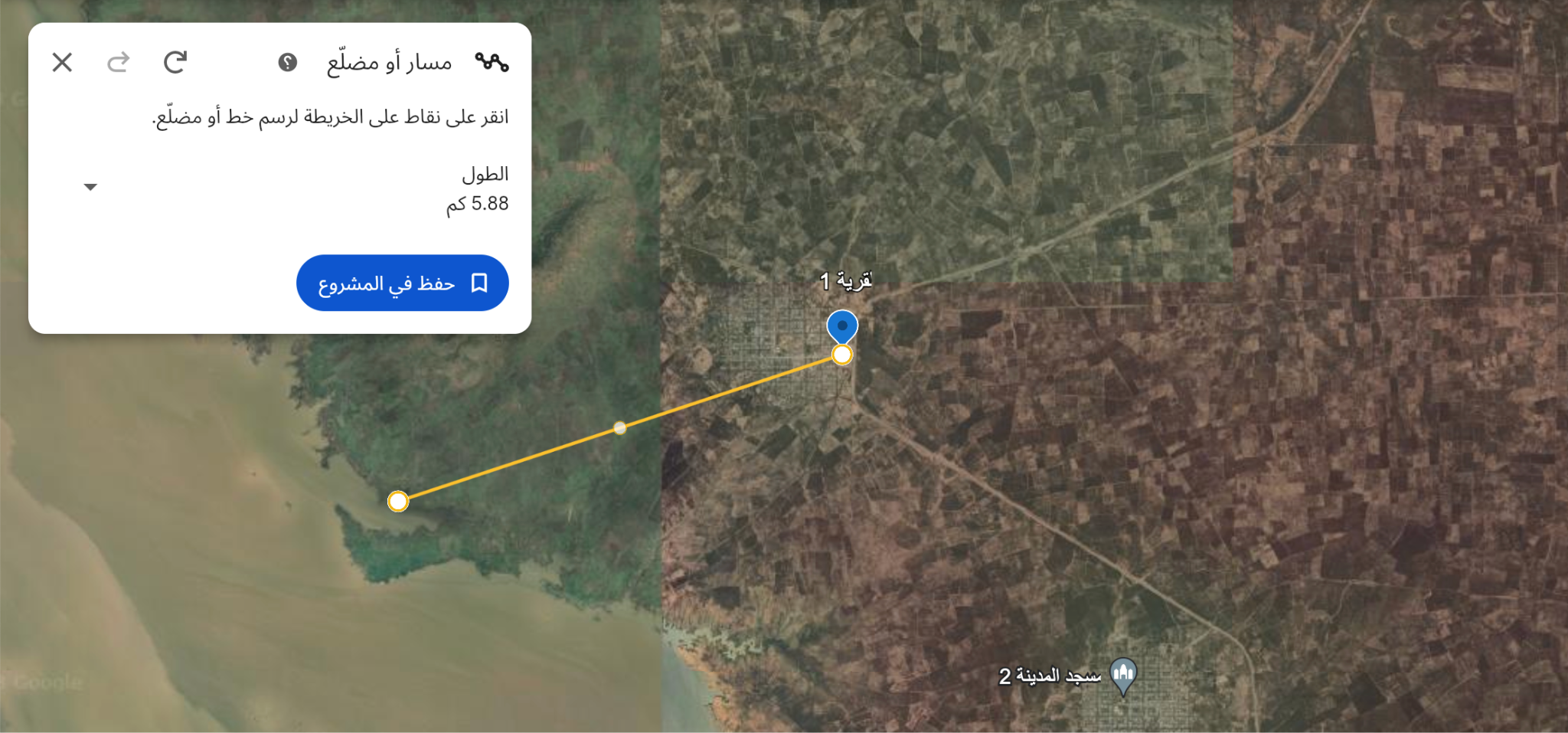
A screenshot shows the distance between the village and the river. Source: Google Maps
Awatif Issa, a farmer, and member of the Blue Nile Women’s Network Charitable Society, summarizes her story by saying: “I live and practice farming in east of Qanees, where the distance from my house to my workplace is about half an hour. Unusually, this year’s rains were ‘light’ and some of my colleagues were forced to replant the beans, cowpeas, and corn due to the dryness of the land. This increased cases of back pain, spinal cord, and sunstroke. They worked from six in the morning until 10 AM without stopping or resting, and they sat down to take a break to rest then resumed until midday before returning to their homes.”
According to the Weather Spark website, which specializes in weather data, the average rainfall in August 2023 reached 5.9 inches.
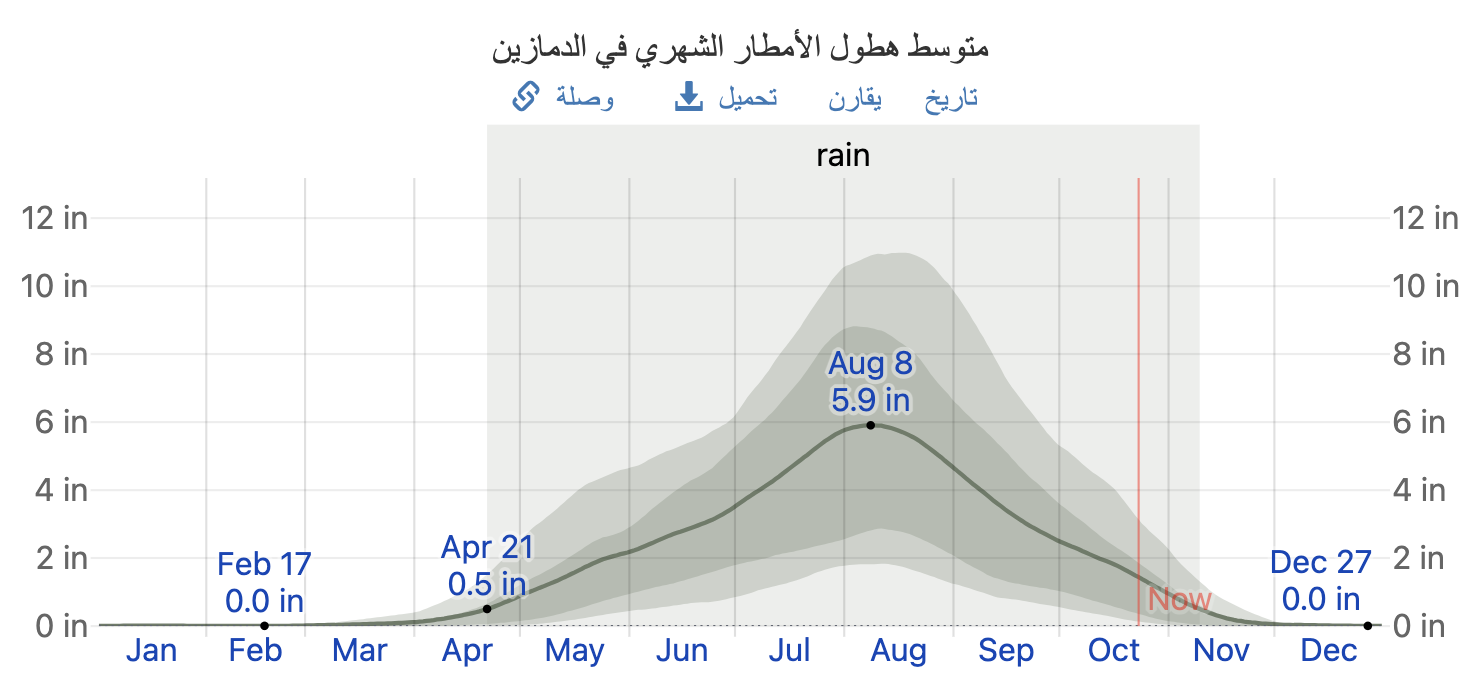
A graph showing the average rainfall in 2023. Source: Weather Spark website
Precautions and Needs
Dr. Marwa Taj Al-Deen, an expert in reproductive health, pointed out that women who have been forced to flee from their homes and now stay in displacement camps face reproductive health challenges. Several factors including floods and drought make it difficult for them to see a doctor even when they are pregnant and were forced to flee their homes during pregnancy.
The arrival of dignity bags containing women's health supplies may be delayed, and may not be sufficient to meet the needs of all women. Women in displacement centers are also exposed to harassment or sexual violence, which may sometimes lead to rape. Due to crowding and lack of bathrooms, some women may not be able to visit the bathroom at night. This means that they may have to wear sanitary pads for longer than necessary, which can lead to severe infections and serious reproductive health problems.
Dr. Marwa explains that the difficulty of life in the camps restricts the movement of women, there is no privacy, and they are crowded. The bathrooms are also far from the camps, which makes it difficult to change sanitary pads comfortably, in addition to the scarcity of water.
There are more direct effects of climate change on women's reproductive health. Climate change affects women and men in many ways, including increasing the risk of respiratory diseases, decreasing reproductive opportunities, and increasing the risk of infertility and delayed childbearing. Studies have also suggested that climate change directly affects the intelligence level of a newborn if the pregnant mother is exposed to harmful emissions. A study published in the US National Library of Medicine reported that its findings indicate that exposure to emissions and pollution impairs the neurological development of the fetus.
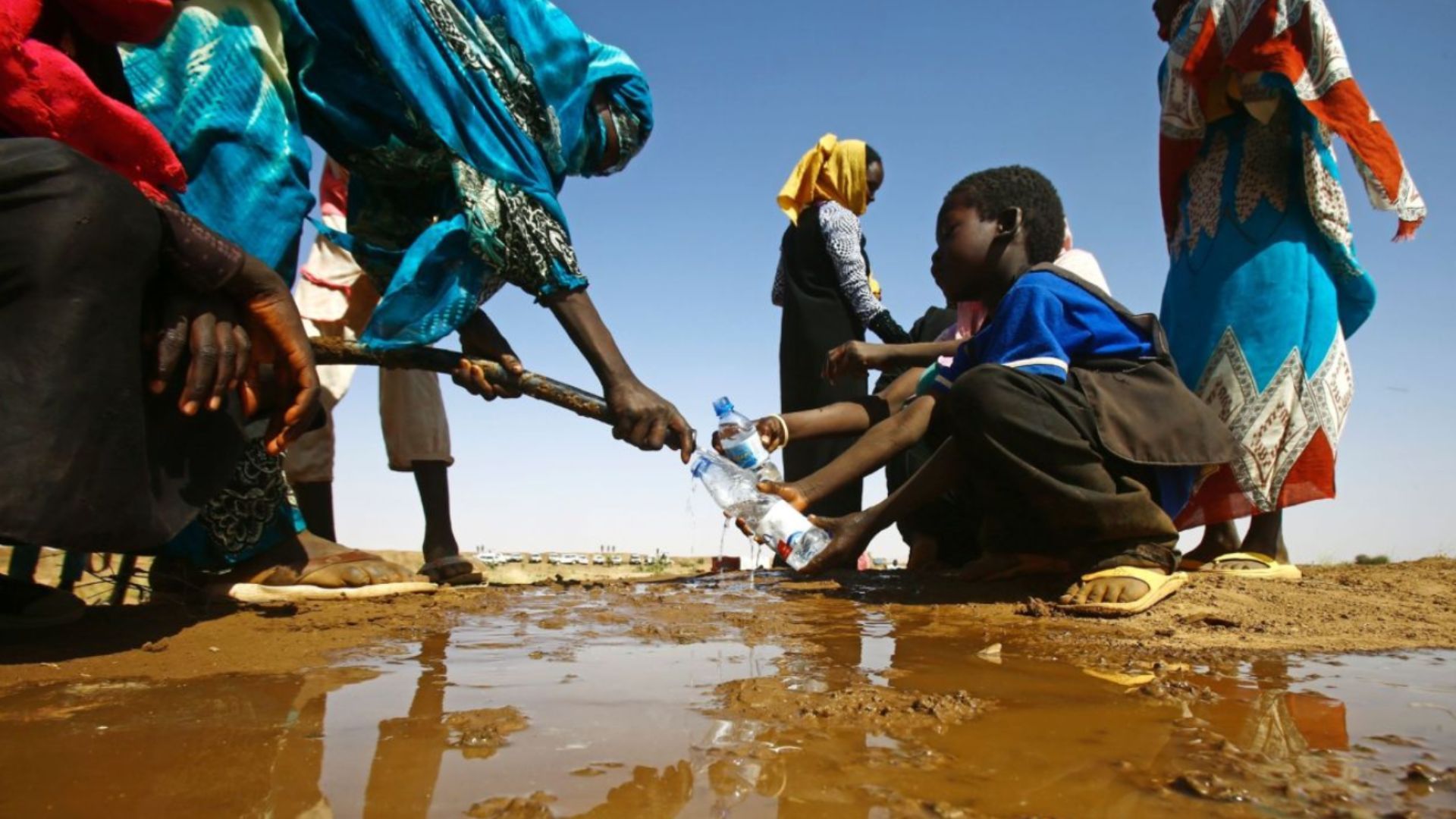
A Sudanese woman fills water bottles held by a young boy about 60 kilometres north of El-Fasher, the capital of the North Darfur state. Source: Ashraf Shazly/AFP
Victims of Natural Disasters
Dr. Al-Qurashi Musa Ali, Director of the United Nations Population Fund's office in Gedaref State and analyst of reproductive health and gender issues programs, said that the climate increases the drought that has affected water sources. This may lead to displacement, asylum, or a change in the agricultural, productive, and industrial lifestyle of the population, and this also affects women who are often in charge of key house chores. He went on to say that women were threatened with sexual and physical assault in the displacement camps in Darfur while going to harvest wood, as climate change had affected water sources and caused the decline of vegetation, making the harvesting journey far from residential areas. Dr. Al-Qurashi emphasized that women and girls disproportionately bear the burden of climate-related events and environmental pressures. Women make up 20 million of the 26 million people already displaced due to climate change.
In Gedaref State, Sudan, areas like Al-Mafaza, Al-Rahad, and Al-Faw are exposed to annual hurricanes, heavy rains, and floods due to the variable climate. These floods lead to road blockages and block movement between cities. It also affects the stability of education and health, either due to the collapse of basic infrastructure, or due to the annual displacement movement that accompanies floods, which leads to the use of schools as shelter centers. A 2016 study by the United Nations Development Program (UNDP) stated that women represent 80% of those displaced due to climate change.
The Danger of Death Threatens Female Children
Dr. Aisha Abdel Aziz from the Women's Awareness Initiative (WAI), works with women in Blue Nile to raise their capabilities and provide them with health tools and knowledge. Women and girls in these localities suffer from constant physical stress due to transporting water over long distances. Girls often fall into wells while trying to fetch water, which may lead to their death. There were several incidents of falling into wells, specifically in the areas of Al-Kili and Al-Shahid Affandi.
The Ministry of Education in several areas implemented evening lessons for girls who were absent from school as they fetched water, but this attempt was not successful due to the girls’ fatigue. The distance of villages from water sources poses a serious health problem for women and girls. Climate change also exacerbates this problem, as it leads to changing rainfall patterns and the decline of water sources.
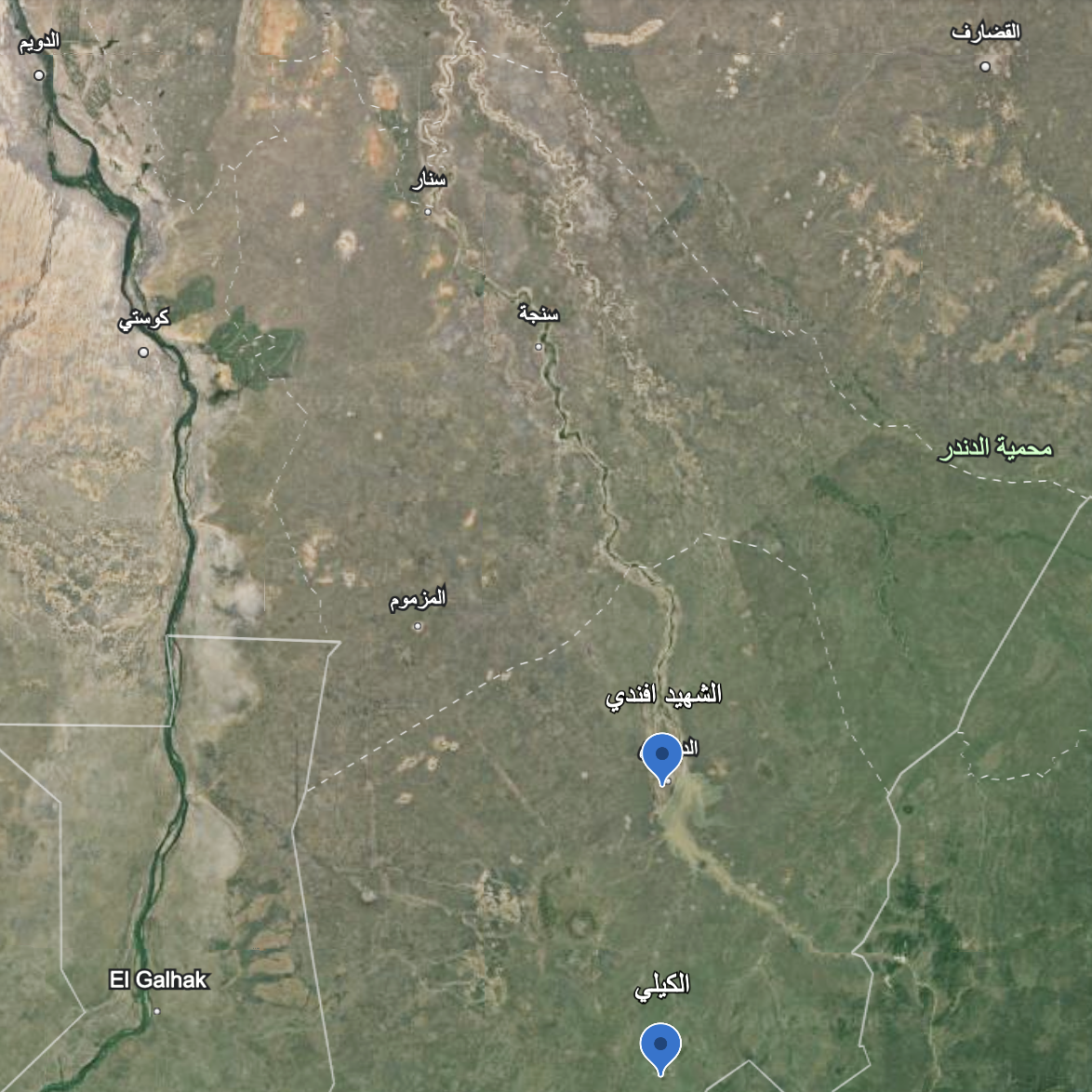
A map showing areas where falls into wells have occurred
Children and Poor Laws
Suleiman Issa Mohamed Ahmed, Assistant Professor at El Fasher University, notes that children engage in agricultural work from a young age with their small families, and the work is initially to fill free time as it is unpaid work. He attributed this to the family's low level of income, which makes them unable to meet their children’s school needs. He confirmed that schoolchildren of both sexes in rural areas practice the profession of collecting wood and charcoal production, and they also work in factories, especially oil factories, for low wages.
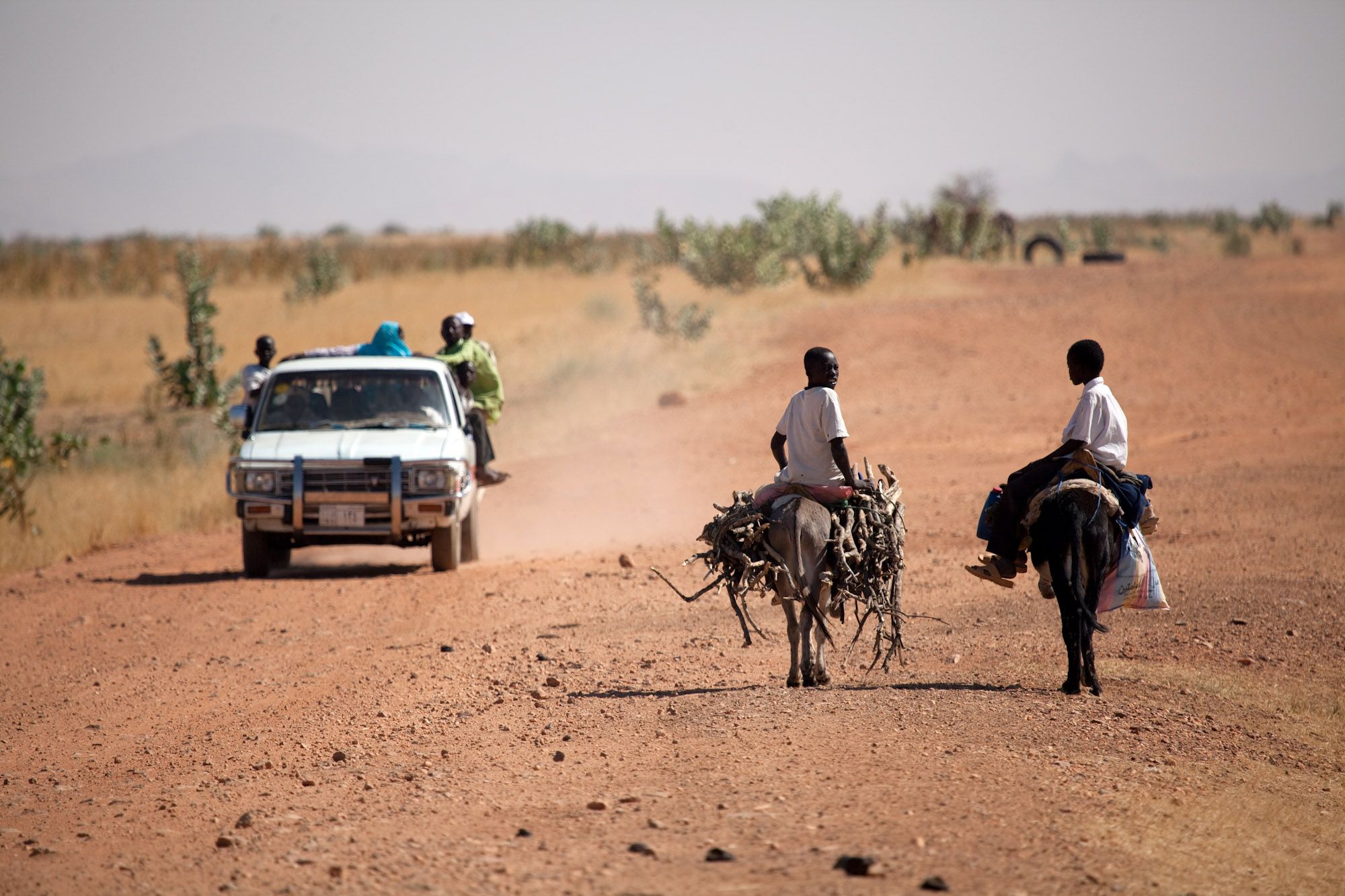
Women and children from rural areas of El Fasher walk long distances every day or by donkey to collect firewood for their families. Source: Albert Gonzalez Farran/UNAMID
The Impact of Local Culture and Climate Change on Women’s Opportunities
Nature conservation specialist Razan Bashir confirmed that climate change affects the education and health of women and girls in Sudan. She attributed this to cultural reasons since women are responsible for providing water for agriculture and other purposes, which consumes their time and makes them unable to learn. She also said that extreme weather patterns such as droughts and floods, lead to the destruction of schools and health infrastructure. It also disrupts studies and work, making it difficult for women and girls to access education and health care.

A woman stranded after deadly floods and torrential rains have devastated East Darfur, causing catastrophic consequences for families and children. Source: UNICEF Sudan
She added that women and girls bear greater burdens than men in agriculture and pastoralism, making them more vulnerable to the economic impacts of climate change. They are also more vulnerable to contracting climate change-related diseases, such as cholera and schistosomiasis, due to the lack of access to clean water and direct contact with water sources.
Previous reports and studies
We often read about reports issued by the United Nations, in which they talked about women and the impact of climate change factors, and stressed that women all over the world are an important factor in change.
“Genderism” and gender inequality are the overwhelming injustices of our time and our biggest challenge is human rights, said Balqis Othman Al-Asha, co-author of the Fourth Assessment Report of the Intergovernmental Panel on Climate Change, a United Nations body. Gender equality and the effort to achieve it go thousands of years back, as the denial of women’s rights is a deeply-rooted act, which creates a gap between the sexes, at the economic, political, social, or professional levels. Al-Asha believes that working to achieve gender equality is the key to addressing the increasing risks posed by climate change.
The World Health Organization believes that climate change leads to the spread of diseases like cholera, dengue fever, malnutrition, and other health problems, as well as drought and floods, leaving citizens to face extreme hunger. WHO emphasizes that climate change poses the greatest threat to human health, and is expected to cause about 250,000 deaths annually between 2030 and 2050 due to malnutrition, malaria, diarrhea, and heat stress. The direct costs of health damages are estimated between $2 and $4 billion annually by 2030.
As such, a report by the United Nations Women's Program stated that women bear 75% of unpaid work around the world, noting that in the event of a disaster, "women do not have the financial resources to deal with the resulting situation."
Women Face Climate Change with Resilience
In a survey we conducted, we tried to measure public opinion on social media sites, keen to know everyone’s opinion and their level of understanding. The number of samples surveyed was 41 people, males, and females, from various segments of Sudanese society, with the female response amounting to 51.2%, while the male response was 48.8%.
A total of 90.2% of the sampled individuals indicated that Sudan is exposed to climate change, due to significant temperature changes compared to previous years, in addition to the overlapping seasons. Climate change has caused an increase in humidity, which has changed the levels of the Nile, especially in Sennar State. This has threatened horticultural activity, which is one of the most important economic activities in the state. It also posed a danger to residents living near the Nile and led to the destruction of horticultural gardens on both banks of the river.
All the statements pointed out that climate change has an economic impact on the Red Sea State, especially the city of Port Sudan. There is an unprecedented increase in temperatures that has led to an increase in water demand, which is an ongoing problem in the region. In addition to an increase in electricity consumption, which has caused problems in the stability of the electrical current itself. Furthermore, the decline in sources of family incomes in the region forced several women to search for job opportunities to support their families and give up education.
One of the individuals who participated in the survey confirmed that women in the Blue Nile region were subjected to forced displacement due to climate change. In a sharp tone, one of the participants criticized the government, saying that it did not pursue a clear policy that would help stabilize and address the environmental impacts of dams, which encouraged an increase in rates of migration and internal displacement due to economic conditions. The migration led to neglect and deterioration of the traditional sectors and reduced women’s opportunities to work alongside men. Traditional agriculture has turned into mechanized agriculture in larger areas.
In the survey’s question ‘does climate change threaten the lives of women and girls,’ 17.1% answered no, while 82.9% answered yes. The survey also included a question about how climate change increases the suffering of women and girls. The results stated that climate change makes them more vulnerable to violence, and also cause displacement from one region to another.
The results pointed out that torrents, rain, and floods usually destroy houses and displace families in the streets and alleys, and most families contain 75% of women and girls, which leads them to be exposed to rape, sexual and verbal harassment, and domestic and social violence. Respondents' opinions indicated that, due to the economic hardships like losses of houses, work, and properties that families are experiencing, girls are exposed to marriage at an early age, to reduce the number of family members, or to bring money in exchange for marriage.
Regarding the adaptation of women to climate change, the survey found that women resist changes in anticipation of the catastrophes that they are used to in their lives, given that the greatest burdens of life's requirements are on their shoulders, whether they are inside the house or in the fields. Besides that, some of them formed cooperative societies that help them provide small needs of health pads and primary health care equipment. As well as establishing classrooms for girls in displacement areas, in the almost complete absence of state institutions.
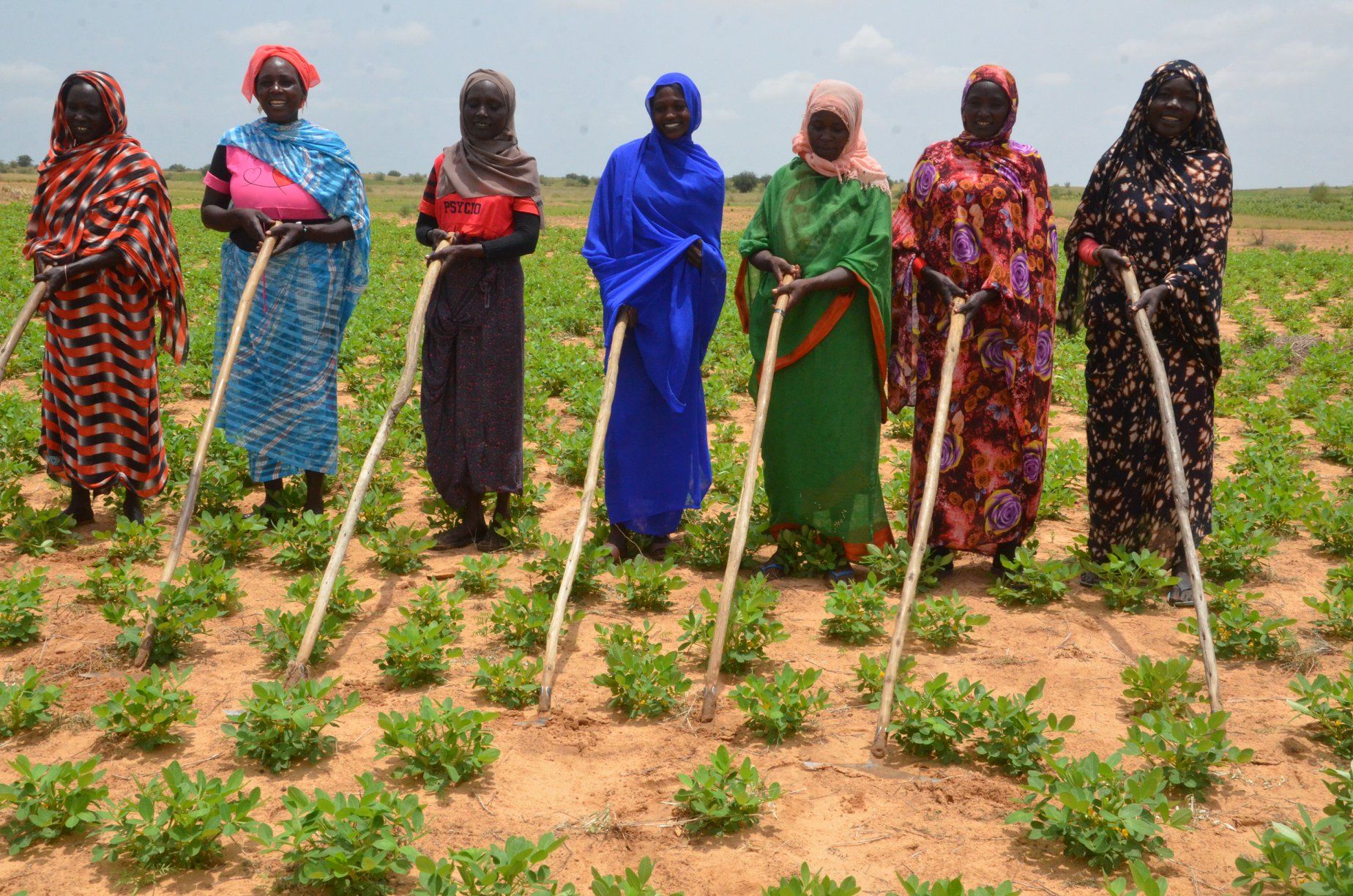
Some of the women in women in Wadi El Ku Catchment that were supported to make a difference in several fields, including agriculture with skills to fight climate change. Source: UN Environment Programme in Sudan
One of the answers indicates that women's livelihood in the rural locality of Goli in the White Nile state depends on agriculture, grazing, and milking sheep. Climate change has changed lifestyles in the region, forcing women to increase the cultivated areas and working hours to obtain greater income. This change in lifestyles is an example of women adapting to climate change.
According to what was cited, the daily suffering of women surges with the increase in climate impacts on Sudan, especially Sudanese women in the countryside due to the complexities they face related to local culture, inequality, and male control over Sudanese societies. Their opportunities for education and health may not exist in some areas. For cultural and health reasons, fragility of infrastructure, and the lack of awareness of decision-makers about climate change and its effects, there are no clear visions to mitigate its impacts. After reviewing many problems, whether related to the health field in general and women’s health in particular, climate change, or women’s education, we see that the solutions are inseparable from the intersectional problems.
Women's awareness must be raised, their education must be ensured, and society as a whole must be aware of climate change, its effects on everyone, and its effects on women in particular. In addition to shedding more light on the daily suffering of women due to the dominant male mentality and the necessity of their presence in decision-making centers, Sudan should not be separated from the international vision to confront these changes. Sudan can join the many countries that rely on the most effective and influential women in local communities, to raise awareness and confront the causes of climate change and thus reduce its impact.
